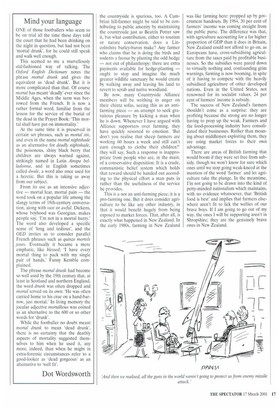Mind your language
ONE of those footballers who seem to be on trial all the time these days told the court that he had been drinking on the night in question, but had not been 'mortal drunk', for he could still speak and walk well enough.
This seemed to me a marvellously old-fashioned way of talking. The Oxford English Dictionary notes the phrase mortal drunk and gives the equivalent as 'dead drunk'. But it is more complicated than that. Of course mortal has meant 'deadly' ever since the Middle Ages, when the term was borrowed from the French. It is now a rather formal word, familiar from the lesson for the service of the burial of the dead in the Prayer Book: 'This mortal shall have put on immortality.'
At the same time it is preserved in certain set phrases, such as mortal sin, and even in the name mortal nightshade as an alternative for deadly nightshade, the poisonous, shiny black berry that children are always warned against, strikingly named in Latin Atropa belladonna, and in English sometimes called dwale, a word also once used for a heretic. But this is taking us away from our subject.
From its use as an intensive adjective — mortal fear, mortal pain — the word took on a popular life among the slangy terms of 18th-century conversation, along with vast or awful. Dickens, whose boyhood was Georgian, makes people say, 'I'm not in a mortal hurry.' The word also developed a specific sense of 'long and tedious', and the OED invites us to consider parallel French phrases such as quinze mortels fours. Eventually it became a mere emphatic, like blessed; 'I have every mortal thing to pack with my single pair of hands,' Fanny Kemble complained.
The phrase mortal drunk had become so well used by the 19th century that, at least in Scotland and northern England, the word drunk was often dropped and mortal served on its own: 'He was often carried home to his crue on a hand-barrow, just mortal.' In living memory the jocular adjective mortallious was coined as an alternative to the 600 or so other words for 'drunk'.
While the footballer no doubt meant mortal drunk to mean 'dead drunk', there is no certainty that the deathly• aspects of mortality suggested themselves to him when he used it, any more, indeed, than when he might in extra-forensic circumstances refer to a good-looker as 'dead gorgeous' as an alternative to 'well fit'.
Dot Wordsworth


































































 Previous page
Previous page